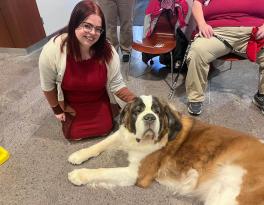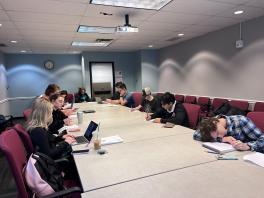Write Mind, a creative writing workshop to improve mental health


Christina Szuch, an embedded clinician for the College of Arts and Sciences, started Write Mind, a creative writing workshop for the Counseling and Consultation Service (CCS), to help student attendees explore the mental health benefits of creative writing.
Szuch is an alumna of the Department of English where she studied creative writing as an undergraduate. Her love for reading and writing began at an early age. In fact, she earned a lot of Pizza Hut Book It! personal pan pizzas for being a young, avid reader.
“I was one of those kids who was constantly reading,” says Szuch. “I think that naturally evolved into wanting to write. I still have an ‘illustrated’ book I wrote at around six years old about sentient foods going about their daily lives, managing whatever interpersonal conflicts sentient foods deal with.”
Szuch enjoyed all the classes on fiction, poetry, creative writing and screenwriting offered by the English department. After graduating with her BA, she now has “almost a full bookshelf of poems and stories by people I know personally.” She adds, “this year I also started a routine of taking a walk and then reading in a coffee shop every Friday, so I’m trying to keep up that Book It! energy even without the free pizza.”
With her Master of Social Work from Ohio State, Szuch became a full-time clinician working closely with students. Szuch likes to include clients’ unique strengths and interests in treatments. She is also excited to explore the role of creative writing, bibliotherapy and other art forms in mental health. “There’s research coming out on things like therapeutic writing groups and bibliotherapy for adults using fiction books and series rather than the traditional self-help books you’d probably think of,” she says.
Szuch mentioned that researchers also study how tabletop roleplaying games, such as Dungeons & Dragons, can be used therapeutically. There is a potential to incorporate every form of storytelling, including creative writing, in mental health treatments.
“I’ve also seen how, anecdotally, a lot of people including myself find comfort in expressing and processing emotions through their art,” Szuch says. “We can let out feelings we might not feel comfortable showing in everyday life, find characters we relate to or admire, or maybe just escape our own anxieties and spend time in a fictional universe for a bit.”
One student organization Szuch was involved in during her time as an undergraduate, The Grove – A Creative Writing Community, inspired her to develop the first–of–its–kind therapeutic writing workshop on campus, Write Mind. She elaborates, “The Grove had a similar structure of prompts, freewriting time and discussion. I used that general structure but added time to read examples by well-known writers...and the psychoeducational components like discussing benefits of writing and where students can go for further mental health resources.”

Each Write Mind workshop lasts 45 to 60 minutes, and students don’t need any prior writing experience to join. The workshop starts with an introduction and a short discussion about wellness tips. After that, students can read short pieces of writing provided by Szuch or look up pieces they find inspiring. Szuch then provides optional prompts based on the reading and encourages students to write for about 20 minutes on mental health concepts.
“Each prompt is based on a different short piece of writing,” she adds. “For example, we read the lyrics to Bo Burnham’s That Funny Feeling and tried to create a list of imagery about our pandemic experience using all 5 senses, or read a Hanif Abdurraqib poem and wrote about a childhood memory brought up by a song.”
Szuch stresses that there’s no pressure to finish or share the writing if students don’t feel comfortable. “I tell students that if they take away nothing else, I at least want them to see what it’s like to dedicate 20 minutes in the middle of a busy week to doing something creative just for fun without pressure or expectations,” Szuch says.
Most participants are part of the First Year Success Series (FYSS) or Second-Year Transformational Experience Project (STEP). Students in both programs can attend any CCS workshop as one of their campus activities. Sometimes, Szuch sees a few engineering and business students visiting the workshop.
Szuch says her favorite part of the workshop is getting to know different types of art students are into and how they incorporate creativity into their lives, such as cooking, knitting, weekly museum trips, photography, dance and music. “Another cool thing is that I’ve had a few students talk to me at the end and ask about ways to get involved with writing communities in Columbus because it’s something they want to do more of,” she says.
Kurt Steelman, a student in STEP, finds the experience “extraordinarily relaxing” and hopes to make creative writing part of their future routine after experiencing first-hand the benefits of creative writing.
“It felt good to come out of the session with a distinct feeling of accomplishment,” Steelman writes in their reflection. “Although I don’t think I wrote anything worth a prize, it was still cool to have a piece of work to call my own. In the future, I will certainly look to creative writing as a way to relax and provide me with something other than a traditional job to work on.”
Szuch plans to run Write Mind in the coming autumn semester and encourages students to check out or request a workshop as part of student organizations, classes or events on the CCS website.
Reflecting on her journey from a book lover and writer to a mental health clinician, Szuch concludes, “Art can’t always be a complete substitute for mental health treatment, but I do see it as a supplement.”
By Han Chen
